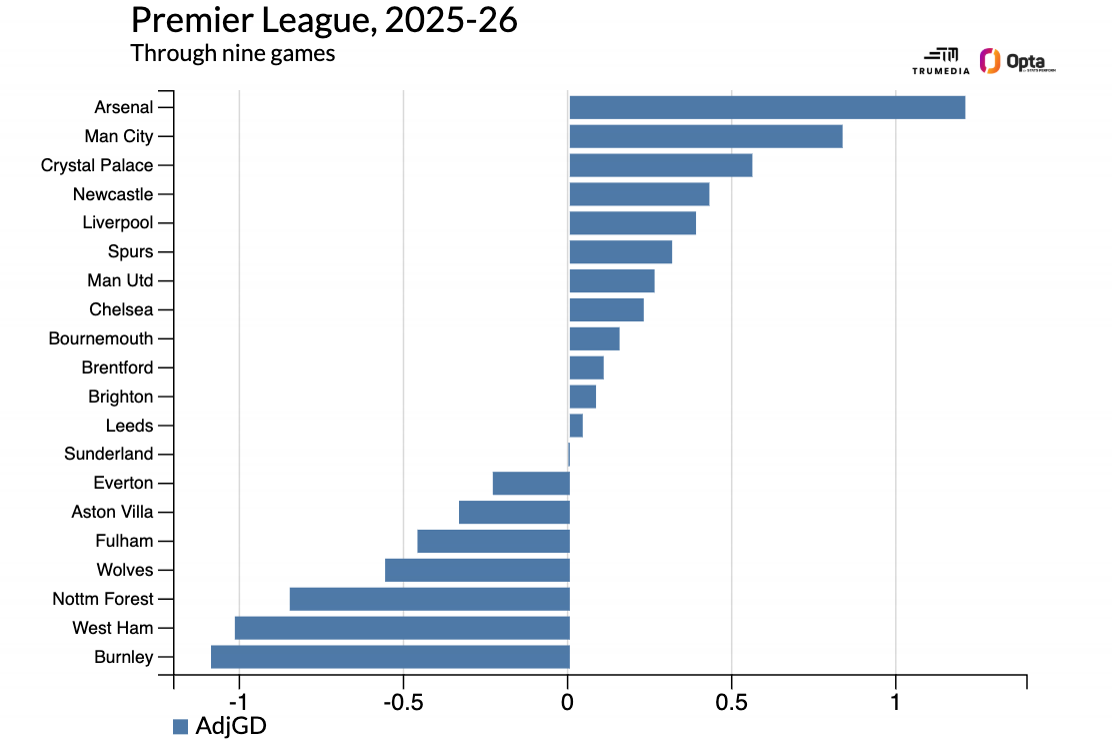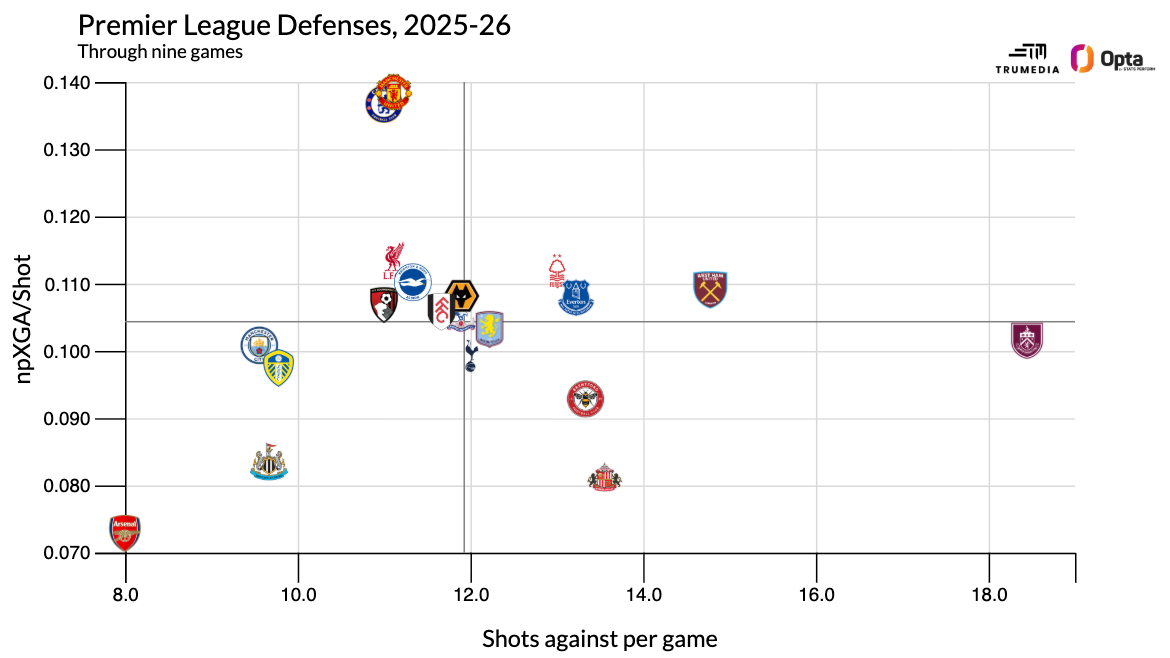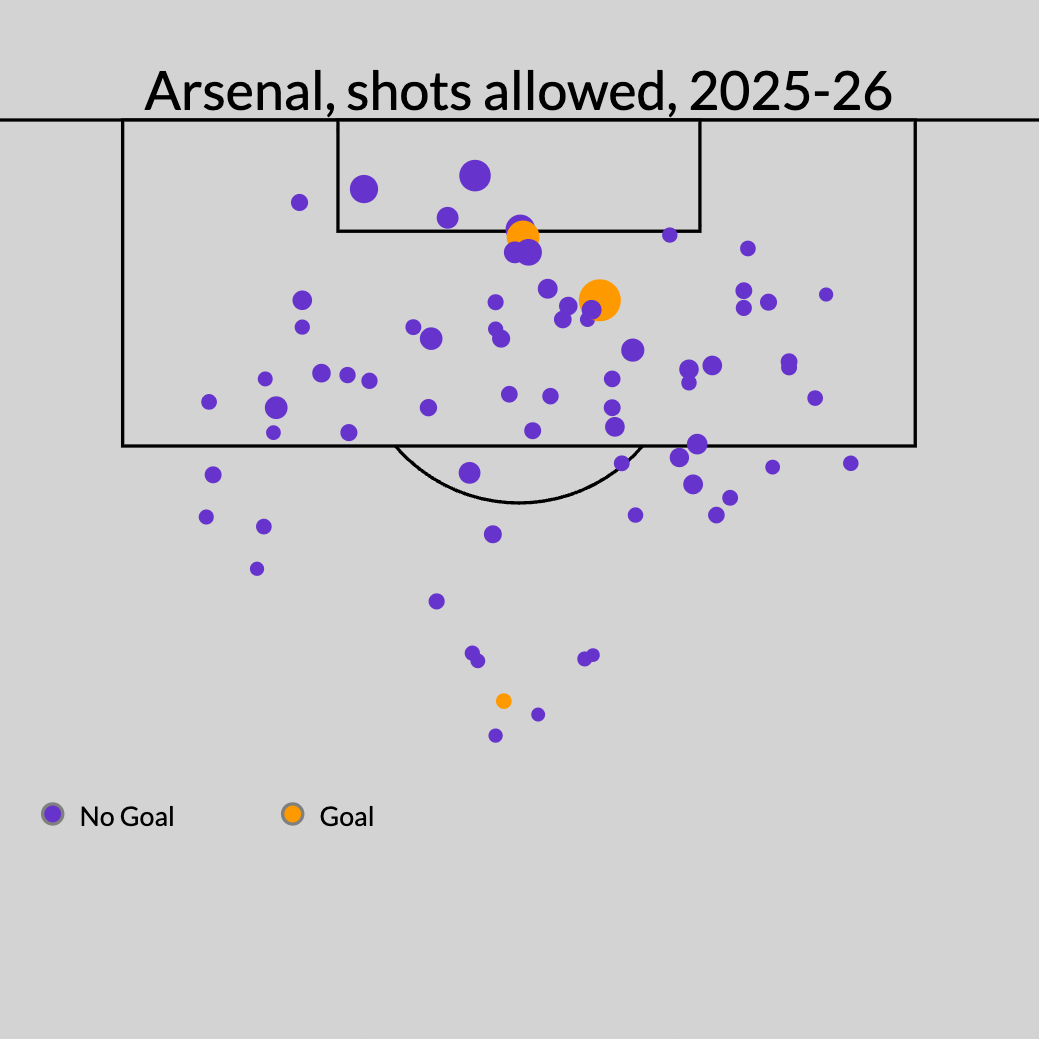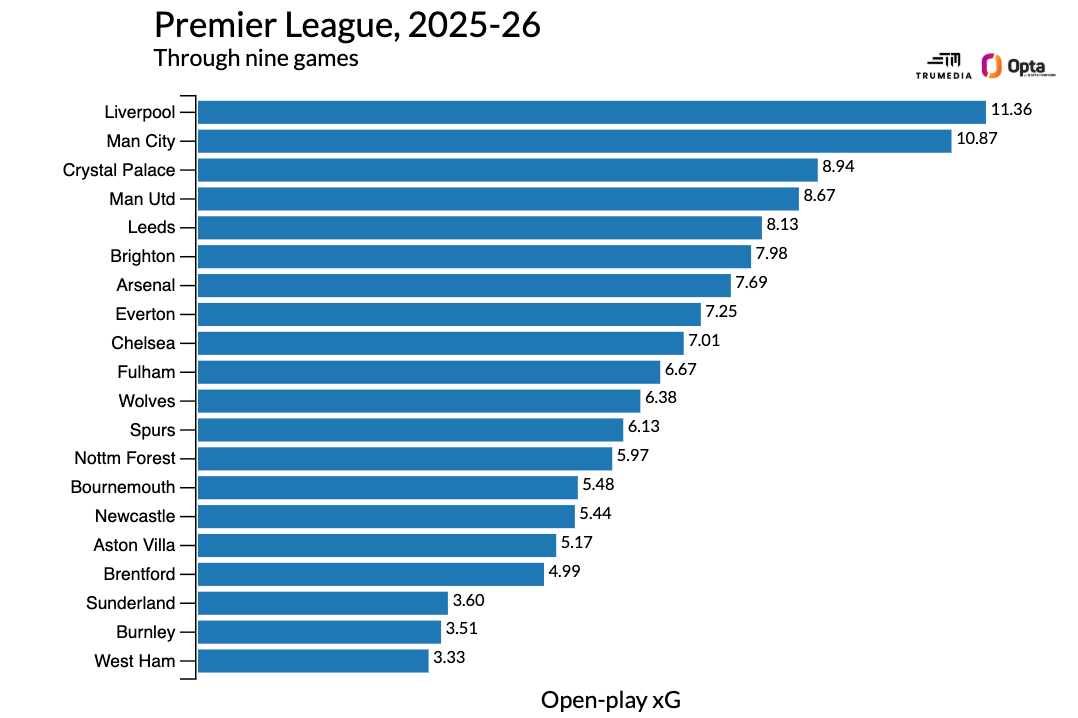Arsenal are going to win the Premier League. That, my friends and my enemies, is easily the most likely outcome of the current Premier League season.
Yes, the Gunners only have a four-point lead over second place and a five-point lead on third through nine matches. The problem, for anyone wanting to refute the sentence of this piece, is that the second place team is Bournemouth, who came into the season with high-mid-table aspirations, and tied for third are Tottenham, who finished last season in 17th, and Sunderland who were one of the three favorites to get relegated.
With Manchester City losing their third game of the season and with Liverpool losing their fourth Premier League game in a row over the weekend, Arsenal's 1-0 win over Crystal Palace on Sunday put them six points clear of Man City and seven points clear of Liverpool. Those were the two other pre-season title contenders. And if there were a fourth, it was the inaugural Club World Cup champions Chelsea, who are doing even worse: currently eight points back of the Gunners.
Now, if you can convince yourself that Bournemouth, Tottenham and Sunderland will keep this up, then (A) congrats on being related to someone on either of those three teams, and (B) we still have a title race. If you can't, then, well, some things will need to fundamentally change for there to be a title race.
We're nine games into the season and Arsenal are clearly the best team in the Premier League. They also have a massive lead on the two other teams who had a legitimate claim to that designation before the season began. With more than 29 games to go, one of the better public projection systems gives them a 79% chance of winning the league.
How did we get here so suddenly? And is there anything, outside of a North London plague or lots of bad bounces, that can stop Mikel Arteta from winning his first major trophy as a manager?
- Set pieces are ruining the Premier League (but helping Arsenal)
- Ranked: All 87 national teams that could win the 2026 World Cup
- Who would you rather have: Kylian Mbappe or Lamine Yamal?
How everything at Arsenal went wrong -- and it didn't matter
If I told you, before the season, that Arsenal would have a commanding lead atop the Premier League, you probably would've believed three things.
The first: Liverpool's signings had failed to gel and all the money spent on attacking players had imbalanced the team. This has been true: Liverpool have arguably been the best attacking team in the league, and only five other teams have conceded more goals.
The second: Rodri wouldn't immediately return to his Ballon d'Or-winning form, and Manchester City's questionable summer signings wouldn't make the team materially better. This also has been true: Rodri has only played about 290 minutes so far, and City are averaging 1.8 points per game after averaging 1.9 points per game last season.
And then, the third: Arsenal's stars would all stay healthy, and the $70-million investment into Viktor Gyökeres would pay off. This one would've been wrong.
After a season where almost every key player spent significant amounts of time on the sidelines, Arsenal's key players have ... continued to get injured. Kai Havertz got injured in the opening game of the season and hasn't played since. Martin Ødegaard has only played a quarter of the minutes so far, thanks to a succession of different injuries. Bukayo Saka and William Saliba have each missed about the third of the season. And then Saka's backup or potentially Arsenal's new starting winger on the left, Noni Madueke, injured his knee in September and isn't expected back until around Thanksgiving.
Gyökeres, meanwhile, has been very available. Only 6% of Arsenal's league minutes this season haven't featured the former Sporting striker. But despite all of the gametime, he's still only scored two non-penalty goals, and he's only attempted 19 total shots. Add it all together, and the combination of Gyökeres, Havertz, Ødegaard, Saka, and Madueke have combined for three non-penalty goals and one assist. Crystal Palace's Ismaïla Sarr has that exact same stat line -- all by himself.
Now, if I outlined all of that to you before the season and told you where Arsenal would be in the table after nine matches, you would've told me that you thought lobotomies fell out of practice decades ago. After I established that my entire brain was still intact, you might've assumed that it was some kind of luck driving this unlikely outcome. Maybe Arsenal, Liverpool, and Manchester City were all well below the typical title-winning level but the Gunners converted their chances at a higher rate or dodged a couple bullets in front of their own goal?
That, too, would've been wrong. At this point in the season, one of the best measures of team quality -- what best predicts future performance -- is a team's adjusted goal differential, which is a blend of 70% expected goals and 30% actual goals. And by that metric, Arsenal are, by far, the best team in the Premier League:

So, uh, how the heck are they doing it?
Why Arsenal might be the best defensive Premier League team we've ever seen
We can take that adjusted goal idea and apply it to a team's offense and defense. Here's the top five defenses for a full Premier League season since 2008-09:
1) Liverpool, 2008-09: 0.6 adjusted goals allowed per game
2) Manchester City, 2018-19: 0.65
3) Manchester City, 2017-18: 0.65
4) Manchester City, 2021-22: 0.66
5) Chelsea, 2008-09: 0.67
Through nine games, Arsenal have allowed an adjusted goal number of 0.51. That would be a 15% improvement on the best defensive team in the Stats Perform dataset.
For most of the modern history of the sport you had to choose between two trade-offs: you could press high, keep the ball away from your goal, but then allow a small handful of high-quality opportunities whenever the opponent did manage to break through. Or you could keep bodies back, allow your opponents to attempt more shots, but limit the quality of those chances.
Incredibly, though, Arsenal are currently leading the Premier League in shots allowed and xG, or expected goals, allowed per shot. They're such an outlier that they're almost literally lying on the outside of this chart:

The Premier League record for fewest goals conceded in a season is the 15 allowed by Chelsea under Jose Mourinho in 2004-05. I'd always viewed that as perhaps the unbreakable record. (Liverpool, the defending Premier League champs, have already allowed 14 goals, and it's not even Halloween yet!) Fifteen goals allowed in 38 games is one of those stats that seems impossible -- like how Wayne Gretzky could've scored zero goals in his career and he'd still be the NHL's all-time points leader. Or how 26.3% of Barry Bonds' career plate appearances ended in either a walk or a home run.
But I'm starting to let myself believe that Arsenal could actually give Chelsea's record a real run. They've allowed three goals in nine games. Over a full season, that would add up to almost exactly between 12 and 13 goals conceded.
Now, they have conceded 5.24 expected goals:

But some of that discrepancy should get credited to Arsenal.
If they conceded goals at their expected rate from here on out, they'll concede 17 more, bringing them up to a disappointing 20 goals allowed, which only would be the third-best mark in league history. But they've also done this while already playing the four teams that comprise the current top four in adjusted goals scored: Manchester United, Manchester City, Crystal Palace, and Liverpool -- in that order.
The Gunners allowed two goals across those four matches, and only one of them came from open play.
So, can Arsenal be stopped?
What makes Arsenal such a dominant defense team? In short: the personnel.
In goal, David Raya is an above-average shot-stopper and one of the better sweeper-keepers in the league. Arsenal can play a higher line than most quality-suppressing defenses because the athletic Raya is so quick to react to any ball played over the top.
In the backline, William Saliba and Gabriel are the best center-back pairing in the world. And then they're flanked by Jurriën Timber and Riccardo Calafiori, two players who have played significant minutes for their previous clubs and current national teams at center back. So, they're both better defenders than most traditional fullbacks, and perhaps more importantly, they're both way more physically imposing than your traditional fullback.
Timber, in particular, is a hellacious defender, constantly swarming the winger or midfielder on his side of the field. If we had a stat that looked at how often a player was able to turn after receiving a pass when a particular defender was within a couple feet, I'm pretty confident Timber would top the chart.
In midfield, Martín Zubimendi is tiny but he might be the smartest defender of his position on the planet -- always getting in the way when an opponent might gain momentum, constantly cleaning up loose balls. Declan Rice is Declan Rice -- the most physically dominant player at this position in the sport. And then whoever is playing in the attacking-ish midfield role, Eberechi Eze, Martin Ødegaard, or Mikel Merino, is a much better defender than the kinds of players we typically associate with that position.
Even up top, there are no bad defenders. For all of his struggles, Gyökeres is a furious presser. And among star wingers, Saka does more defensive work than anyone else in the world, by a good margin.
So, it all adds up to a team that can both press high and defend deep, at world-class levels. It's really hard to move the ball past their front line, it's a huge pain to get beyond the midfield, and if you're somehow able to get beyond the first two lines: there's Gabriel and Timber ready to pound your into submission or William Saliba reading your pass before you've even decided to make it. Good luck!
Now, although Arteta and Arsenal have managed to create a defense without any trade-offs, there are some trade-offs on the other side of the ball.
If you have a defense this talented, then there's really only one way you can pair it with a world-class attack: be Bayern Munich, Real Madrid, Barcelona, or a club owned by a sovereign wealth fund. Those are the only teams we've ever seen do both in the modern era. If all of Arsenal's world-class defensive players were also world-class attacking players, then they'd simply just have a roster of all of the best players in the world. Now, it is a fantastic roster, but that's because of the depth they've built up, rather than the absolute high-end talent.
By adjusted goal differential, Arsenal currently rate as the 13th-best Premier League team since 2008 -- almost exactly as good as last season's Liverpool. But among the top 15 teams since 2025, Arsenal are the only one with an adjusted goals-scored rate below 2.0, and they're all the way down at 1.71. That ranks as just the 63rd-best mark since 2008.
And that's counting all of the set pieces. Through nine games, Arsenal have scored a league-leading nine set piece goals. Throw in the two penalties, and they've scored 16 total goals -- as many as Liverpool and just one fewer than City and Tottenham. But that means the Gunners have only scored five goals in open play -- fewer than all but four teams in the Premier League.
They've been running cold in front of goal when they're not in set-piece situations, but they're still only seventh in open-play xG through nine matches:

We've never seen a defense as good as Arsenal currently are. We've never seen a team as good at set pieces as Arsenal currently are. And we've never seen a team as good as Arsenal currently are create as few chances as Arsenal currently do.
Most outliers eventually regress to the mean, but not all of them. There exists a world where Arsenal stay this dominant on defense and set plays, while they improve at open play as Saka gets more minutes and the likes of Havertz, Ødegaard, and Madueke return to health. There is another world where the set pieces and defense decline from their generational heights, while the open-play attack stays stuck where it is.
That is the world where Arsenal don't go on to win the league: the set-piece goals start to dry up, the open-play performance doesn't improve, and the defense becomes simply elite, rather than all-time great. They start tying a bunch of games, lose a few 1-0s, and either City or maybe Liverpool find something that clicks, one of them gets hot and goes on a long win streak while the Gunners pick up a bunch of ones instead of threes.
The most likely outcome, though, is probably this one: the defense and set-pieces slow down a bit but the open-play performance picks up enough to pick up the slack. Arsenal end the season with a heavier defense-to-offense and set-play-to-open play skew than most top teams, but they look a little more normal and maintain the overall level they're currently at.
And in that world? Arsenal are winning the Premier League.
